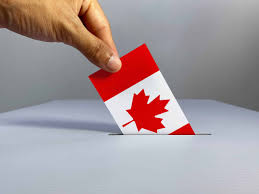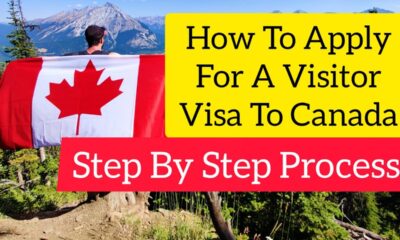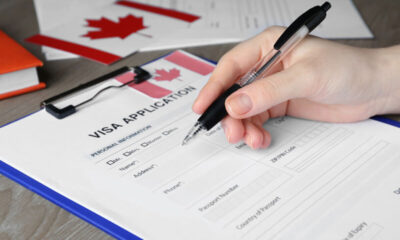TRAVEL TO CANADA
Requirements to Migrate to Canada Through Marriage Visa
Canada is a popular destination for individuals seeking to reunite with their spouses or partners. If you are married to a Canadian citizen or permanent resident, you may be eligible to migrate to Canada through a Marriage Visa. This process, officially known as spousal sponsorship, allows your partner to sponsor you for permanent residency.
Understanding the requirements, eligibility criteria, and application process is crucial for a smooth immigration journey. This comprehensive guide covers everything you need to know about how to migrate to Canada through a Marriage Visa, including key documents, processing times, and common challenges.
What is a Marriage Visa for Canada?
A Marriage Visa (spousal sponsorship) is an immigration pathway that allows a Canadian citizen or permanent resident to sponsor their spouse or common-law partner for permanent residency in Canada. Unlike a temporary visitor visa, this leads to permanent resident status, granting the sponsored individual the right to live, work, and study in Canada indefinitely.
Types of Relationships Eligible for Sponsorship
- Spouse – Legally married partners.
- Common-Law Partner – Unmarried couples living together for at least 12 consecutive months.
- Conjugal Partner – Partners in a committed relationship but unable to live together due to legal or immigration barriers.
To successfully migrate to Canada through a Marriage Visa, both the sponsor and the sponsored person must meet specific requirements.
Eligibility Requirements for the Sponsor
Before applying, the Canadian sponsor must meet certain conditions:
1. Age and Residency Status
- Must be at least 18 years old.
- Must be a Canadian citizen or a permanent resident.
- If a citizen living abroad, must prove intent to return to Canada when the spouse arrives.
2. Financial Ability
- The sponsor must demonstrate they can financially support their spouse and any dependent children.
- Unlike other sponsorship programs, there is no minimum income requirement for spousal sponsorship, but the sponsor must not be on social assistance (except for disability).
3. Previous Sponsorship Commitments
- If the sponsor has previously sponsored another spouse, they must wait 3 years before sponsoring a new partner.
- Must not have unresolved immigration violations or criminal records.
4. Legal Obligations
- Must agree to financially support the spouse for 3 years from the date they become a permanent resident.
Eligibility Requirements for the Sponsored Spouse
The person being sponsored must also meet certain criteria:
1. Genuine Relationship
- The marriage or relationship must be legally valid and not for immigration purposes only.
- Proof of a genuine relationship includes:
- Marriage certificate (if legally married)
- Joint bank accounts, leases, or utility bills
- Photos, communication records, and affidavits from family/friends
2. Medical and Security Clearance
- Must pass a medical exam by an approved physician.
- Must provide a police clearance certificate from all countries lived in for more than 6 months.
3. No Inadmissibility Issues
- Must not have a serious criminal record or pose a security risk to Canada.
Step-by-Step Process to Migrate to Canada Through Marriage Visa
Step 1: Gather Required Documents
Both the sponsor and the sponsored spouse must compile the following:
- Marriage certificate or proof of common-law relationship
- Proof of sponsor’s Canadian status (citizenship certificate or PR card)
- Police clearance certificates
- Medical exam results
- Completed application forms (IMM 5532, IMM 1344, etc.)
Step 2: Submit the Application
- The sponsor submits the sponsorship application along with the spouse’s permanent residency application to Immigration, Refugees and Citizenship Canada (IRCC).
- Applications can be submitted online or via mail.
Step 3: Pay Application Fees
- Sponsorship fee: $75 CAD
- Principal applicant processing fee: $490 CAD
- Right of Permanent Residence Fee (RPRF): $515 CAD
Step 4: Wait for Processing
- Processing times vary but typically take 12 months for inland applications and longer for outland applications.
- IRCC may request additional documents or an interview.
Step 5: Receive Confirmation and Land in Canada
- If approved, the spouse receives a Confirmation of Permanent Residence (COPR).
- They must then land in Canada to activate their PR status.
Common Challenges When Applying for a Marriage Visa
1. Proving a Genuine Relationship
- IRCC scrutinizes relationships to prevent fraudulent marriages.
- Provide extensive proof, including travel records, joint financial commitments, and testimonies.
2. Delays Due to Incomplete Applications
- Missing documents or incorrect forms can lead to rejections or delays.
- Double-check all requirements before submission.
3. Medical or Criminal Inadmissibility
- Certain health conditions or criminal records may require additional steps, such as a temporary resident permit or rehabilitation application.
Benefits of Migrating to Canada Through a Marriage Visa
- Permanent residency with the right to live, work, and study anywhere in Canada.
- Access to healthcare and social benefits after meeting provincial residency requirements.
- Pathway to Canadian citizenship after 3 years of permanent residency.
- Ability to sponsor dependent children in the future.
Migrating to Canada through a Marriage Visa (spousal sponsorship) is a viable pathway for couples seeking to build a life together in Canada. By meeting the eligibility criteria, submitting a complete application, and providing strong evidence of a genuine relationship, you can successfully obtain permanent residency.
If you’re considering this immigration route, consult an immigration lawyer or consultant to ensure a smooth process.
Frequently Asked Questions (FAQs)
1. How long does it take to process a Marriage Visa for Canada?
Processing times vary but typically take 12-18 months, depending on the application type (inland or outland).
2. Can I work in Canada while waiting for my Marriage Visa?
Yes, if you apply through the Inland Sponsorship route, you may be eligible for an Open Work Permit.
3. What if my marriage is less than 2 years old?
Even newly married couples can apply, but they must provide strong evidence of a genuine relationship.
4. Can a permanent resident sponsor a spouse?
Yes, both Canadian citizens and permanent residents can sponsor their spouses.
5. What happens if my application is rejected?
You may appeal the decision or reapply with additional supporting documents.
By following the right steps and ensuring all requirements are met, you can successfully migrate to Canada through a Marriage Visa and reunite with your loved one.
Would you like assistance with your application? Contact an immigration expert today!











